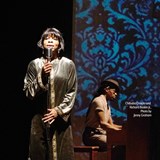By Brian Robin
Chibuba Osuala Finds Her Voice Playing Nina Simone
Chibuba Osuala knew this “life changing role” would challenge her, burden her and liberate her—all at the same time. It would validate her own struggle to reach this point as she portrays of one of the 20th century’s greatest—and most complex—singers.
She played Nina Simone in a one-woman show in graduate school at NYU. She put in her research: watching the Netflix documentary and every interview she could get her eyes on. She read Simone’s autobiography and watched concert performance after concert performance, looking for every mannerism, every subtle and not-so-subtle nuance Simone displayed.
It all led up to the SCR stage and embodying one of the most iconic and versatile voices in music history, capturing Simone’s turbulent, bipolar personality and keeping true to her voice.
Did we mention this is her first musical role on stage?
“In high school, I was a musical theatre major who was never in a musical,” she said. “This is my first time ever in a production singing in front of people, which is traumatic for me in a way. I act to access certain parts of my voice and doing this helped me understand parts of my voice. I’m still getting to know my voice, which sounds different than I thought it would. I’m tapping into a different part of my voice that I don’t access.”
And Osuala’s tightrope-without-a-net performances in SCR’s production of Nina Simone: Four Women are drawing critical praise and sold-out audiences to the Julianne Argyros Stage.
“As a singer, Osuala fully invests in her singing in a Simone-esque way, all in,” C.P. Smith wrote in the Orange County Register.
Eric Marchese in the Newport Beach Independent called Osuala’s performance “riveting.” And here’s how Patrick Chavis described Osuala’s performance in his review for The Orange Curtain Review:
“When I closed my eyes and listened to Chibuba Osuala sing, I could easily fool myself into thinking that Nina herself was singing right in front of me. Then I opened my eyes, and she resembled Simone as well.”
Since she was 11, Osuala wanted to sing on stage somewhere: in high school at Idyllwild School for the Arts, at SUNY Purchase, at NYU. Wherever she could.
And at every stop, Osuala’s acting ability got in the way.
“I view myself as a singer who could do other stuff, but people identified me as an actor, ‘You’re that actor,’” she said. “People didn’t invest in my musical voice. It was difficult for me to have people wipe out my creativity, telling me ‘You’re an actor. People didn’t help me with what I wanted to work at. They helped me with what I was good at already.”
Osuala paid for singing lessons out of her own pocket at SUNY Purchase. When she got to NYU for graduate school, where she earned a Masters in Arts and Trauma Studies, she took singing classes outside of school. This taught her something else: that this struggle to sing took its toll in other ways.
“I had a traumatic experience as an undergrad that made me stop performing in front of my classmates,” she said. “Something in my subconscious kept tripping me up, programming in me that this was a dangerous place to go. I noticed the symptoms and roots and understood that you’re shutting my life down and I needed to root you out.
“… Back in 2019 and 2020, I couldn’t have played this role. I had too much trauma wrapped up in me. My jaw was so tight, my muscles were so tight and my tongue would literally pull back when I would try to sing. My body shut me down and I had to do yoga and Pilates and vocal warmups to relax.”
Osuala’s internal struggle, her realization that she needed to sing to get past it, unlocked parts of her talent for everyone to see. She likened her discovery to “a shaken Coca-Cola bottle” ready to burst out and make a splash.
“I came in (to acting) to express myself, to engage,” she said. “I didn’t come into it to be someone else. I came into it to be myself as much as possible. Playing different characters, I discovered different things about myself. I don’t use characters as a mask. I use them as a mirror.”
This is why Osuala is a natural Nina, even as she calls the role “intimidating” and “a daunting task.” Playing her in a one-woman show when the goal is to strictly imitate her is different than playing her in a fictional context when you’re trying to capture a historic figure at a moment in time. While imitation was inevitable in both productions, Osuala realized the difference when she understood she and Simone had more than a few things in common.
“It’s difficult trying to imitate someone and it wasn’t as productive as you’d think,” she said. “I began to trust myself in ways I identified and related to her. The previous way I played her was to represent her as she saw herself. In this one, there’s more of Nina Simone as a character in a full-length play. This one was different in there’s a lot more layers and more of an objective perspective here vs. a more subjective perspective in my previous work.
“… In both processes, it’s trying to imitate her exactly, but what helped me represent her more authentically was trusting my own genuine connection with her story. There are certain things we understand and relate to. But things like being someone odd, someone labeled difficult, honest and unapologetic as a woman, especially a Black woman, there were so many things on a personal level I can relate to. Once I trusted that and trusted my authentic connection, I was more authentically representing her.”


